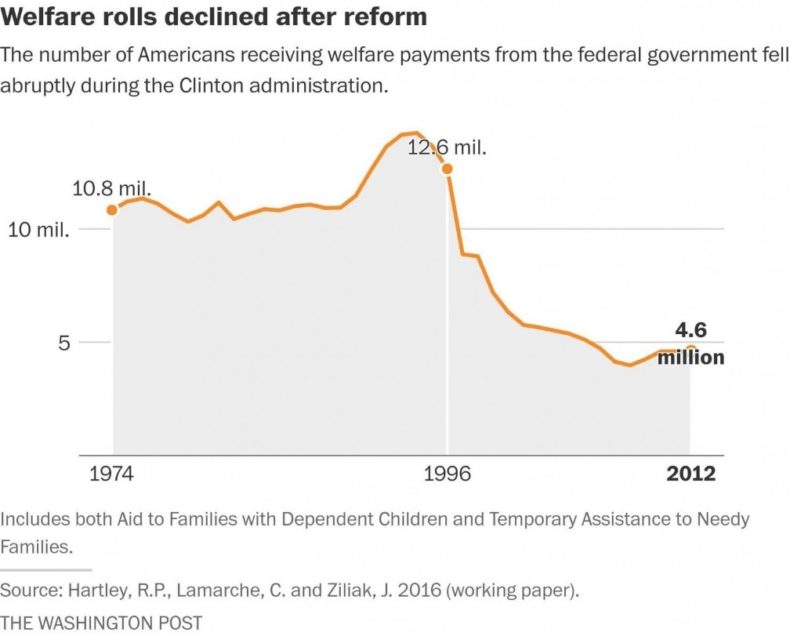Former US President Bill Clinton made the promise to move away from overly generous welfare policies, since they risked trapping families in welfare dependency rather than help them climb the social ladder. “I have a plan to end welfare as we know it”, Clinton explained in a TV spot during his campaign for office. Twenty years ago he kept his promise by introducing wide-ranging welfare reforms. As The Washington Post explains, the reforms had significant effects on welfare rolls. The number of Americans receiving welfare payments from the federal government has fallen abruptly, from 12.6 million at the time to 4.6 million today. This is quite astonishing in a time when the US has received many immigrants from low-income countries in Latin America.
Although the reforms has stimulated groups such as single mothers to work in a greater extent (something that often can improve the chances of their children to themselves avoid poverty), it has also brought on deeper problems for the adults who do not find work. Perhaps this explains why the Democrats under President Barack Obama, and likely candidate to become the next president Hillary Clinton, have started rolling back the reforms of Bill Clinton. The goal is to create more generous entitlement programs. And it is very obvious what role model the American left is trying to emulate – the democratic socialist model in Nordic countries.

I deal with the issue of how the American (and global) left is admiring the Nordic nations in my new book “Debunking Utopia – Exposing the Myth of Nordic Socialism”, which only a week after its release has gained more than 50 citings by international media. Perhaps it makes sense for Americans to move towards a somewhat more generous welfare state, one can always argue what the optimal level of generosity is. It is however quite striking how the American left is pointing to Denmark and Sweden as the two prime examples of why generous government benefits can be introduced. Aren’t they following what is actually happening in these two countries?
Let’s just look at the most recent development. Already the former Danish government – lead by the social democrats – started a nationwide debate about the need to change the welfare contracts. The idea is that welfare should focus on public services such as education, while the Danes should rely much less on government handouts in the future. The new centre-right government that took office has, not surprisingly, continued on this path. After it won the 2015 general election the government has amongst other introduced new lower welfare benefits for immigrants. The lower payment is equivalent to about half the amount received by those on normal unemployment benefits. The Local reports that the new rules were expanded on the first of July this year, to retrospectively include any refugee registered in Denmark within the last seven years. The government and their supporting parties recently announced that the saving on welfare payments were to be used in order to reduce taxes.
In Sweden – the only Nordic country which currently is led by a Social Democrat government – the conservative opposition party announced in July that a benefit ceiling should be introduced. The idea is that the benefits given to a family should never exceed 75 percent of the effective minimum wage (Sweden doesn’t have minimum wage laws, but a sort of minimum wage is set by union contracts) that a working family would receive after taxes and working family benefits. In a press release the party went even further today, amongst others stating (my translation to English):
“The poverty trap that particularly many foreign born women are trapped in must be combated by seeing to that more enter work and self-sufficiency. Foreign-born women have an employment rate that is 23 percentage points lower than that for native-born women. In total one of ten foreign born are given welfare support while only one amongst a hundred native born are given the same.”
Besides the already suggested benefit ceiling the conservatives are calling for reduction of the parents’ allowance given to non-working families. Instead, the opportunities for the children of welfare families to participate in preschool is to be expanded. The idea is to reduce welfare payments while giving the children of economically marginalized families greater chance to escape poverty through education.
The press conference was held by Ulf Kristersson, spokesperson in economic issues, and Anna Kindberg Batra, party leader of the conservatives. In an article published today Kristersson expanded on the reason for the suggested welfare reforms (my translation from English): “Because, although Sweden is experiencing a strong an economic boom, dependency on public benefits is not being reduced. In 2020 a million people are expected to be in social exclusion, entirely supported by public benefits”. This, of course, is quite a high number for a country where around five million people are in work.
Perhaps it makes sense for the American left to expand the generosity of the US welfare state, scaling back Clinton’s welfare reforms even more than what has already been done. And perhaps it makes sense for the left in the US and many other parts of the world to point to the Nordic countries as the main argument for why generous welfare works. But then again, aren’t they missing the big picture? Nordic countries have been able to introduce large welfare states because they have historically had uniquely strong working and responsibility ethics, and because these societies largely managed to eliminate poverty during the small government era of the first half of the 20th century. Today, as the population has adapted their norms to generous welfare and as the share of immigrants has grown, the welfare model is being rolled back. In fact, for the last two or three decades, Nordic countries have focused on market reforms, tax cuts and welfare reforms rather than on continuing along the path of democratic socialism. Are those who see the Nordics as the prime role model for socialist policies aware of this?
Dr. Sanandaji’s latest book, ‘Debunking Utopia – Exposing they myth of Nordic socialism’, is published on the 16th August by WND books, RRP £12.97.


